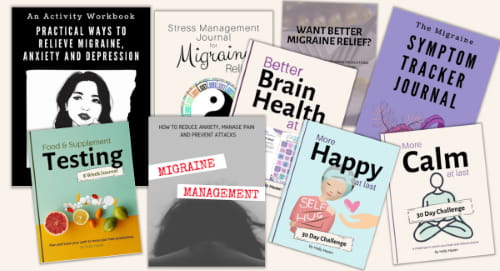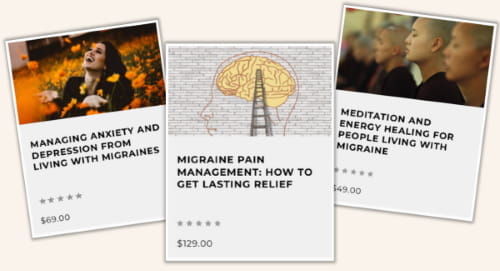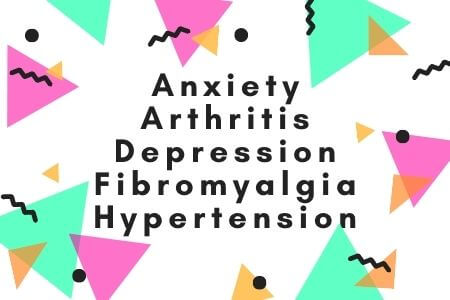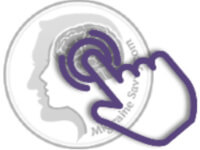- Home
- Associated Conditions
- 5 Tips to Stop Stress Related Migraine Headaches
5 Tips to Stop Stress Related Migraine Headaches
Do you get stress related migraine headaches? Whether your stress is from physical stress or emotional distress, the brain reacts. Did you know that you can retrain your brain to deal with high-anxiety situations?
Yes you can. Your brain can be trained.

Imagine this ... it's Christmas and Aunt Joan, the loud one, who always accuses you of something that riles you up, will be sitting right beside you for hours ... and hours. You know you are going to snap, just like last year, and the year before that. And say something inappropriate. Again.
Or you are at work and you said something you shouldn't have to your boss. You are anxious about the next attack you can feel creeping up your neck and you need to ask if you can go home early. AGAIN. And you know your co-workers will just roll their eyes at you. Again.
Or even worse they will challenge you or call you a name that leads you down the shame and guilt highway.
Regardless of where your stress comes from, here are some great tips to help cope with conflicts that may arise and also some ideas for reducing stress related migraine headaches.
Stress is considered a migraine headache trigger. So it is important to try to keep your life as stress free as possible.
You may need to make some changes to your lifestyle to reduce the occurrence of your attacks. Exercising regularly is proven to reduce stress related migraine headaches.
Getting plenty of rest, staying well hydrated and doing things you enjoy as often as you can are also proven to help reduce attacks. Taking care of the physical body is important. It gets stressed too ... without us noticing.
What helps me is focusing therapy, biofeedback and meditation. I like this easy migraine relaxation technique, and I use guided meditation CD's every day to reduce stress. And I practice getting to know my emotions.
It could be that the more you learn to control your emotions, the fewer stress related migraine headaches you will experience. So keep reading!
My #1 Choice in Magnesium Supplementation
Learn To Manage Conflict To Reduce Stress Related Migraine Headaches
Bob Burg's recent book "Adversaries into Allies: Win People Over Without Manipulation or Coercion" has some really amazing principals that I think we need to know about.
These are actually sales and marketing tips, but they fit in with what I use and teach as a professional counselor.
They provide the help we need for reducing any chance of yet another stress related migraine headache attack due to added pressures.
Life brings with it a myriad of emotions: happiness, sadness, loneliness, competitiveness, stress and joy to name but a few. And then there are times every year, like at Christmas, when we are being pushed around by crowds and little old ladies shopping, sitting in increased traffic, being late, or dealing with more alcohol fueled related comments, that push us to our limits!
And we can’t miss out mentioning family obligations that get served up with a side dish of guilt!
Burg talks about manipulation (win-lose intention) and persuasion (win-win intention) and what makes people move to action. Life's challenges can bring out the best in some of us, but for others increased stress related migraine headaches and depression visit far too often.
Here are 5 of Bob Burg’s principals to avoid conflict...
Principal #1 – Control Your Own Emotions
Develop the ability to make a friend of an enemy. Don’t ignore your emotions. We are, after all, emotional beings. Our buttons can get pushed by anyone at the best of times.
And those closest to us know exactly how and when to push those buttons.
Burg quotes Dondi Scumaci "by all means, take your emotions along for the ride, but make sure YOU are driving the car." [1]
This is vital now with social media. You can react and immediately it will appear for the world to see and comment on, oh – and judge you.
An action strategy Mr. Burg says is to rehearse and visualize the results you want. So practice makes perfect. Yes?
You know what and who pushes your buttons. Find a moment to recall what you used to do and how you used to react. And then visualize what you would like to do or say. See yourself being calm, listening to them and taking a moment to decide just what to do. I often say to remember this word PAUSE.
"It's OK for me to pause now", I say silently to myself.
Listen to that person first.
Take some time to respond.
See it turn out peacefully.
Learn to respond instead of react. Bob mentions how Astronauts do a significant number of simulations before actually going up into space. I loved this … so, practice … practice … practice. (pg.35)
We know that "the subconscious mind can’t tell the difference between what has actually happened and what has been suggested to it."
He also says to celebrate when you get it right. Changing your response patterns, that are ingrained habits, take time and some effort. Take pleasure in the fact that this time, you did and said the right thing. But cut yourself some slack when you don’t get it right. Just stay positive and imagine your self responding calmly. And then rehearse it until it feels natural.
We have also talked about taking a time out – taking a little cooling off period on anger management for migraines.
# 2 – Understand That You Are Different
It is good to understand the clash of belief systems that make up our differences.
A belief is really a subjective truth – meaning - how we understand the truth to be. So the truth - our truth is our personal experience of an event or situation.
Burg calls it our "unconscious operating system", meaning that we are not even aware of it. Our truth is a result of our belief systems accumulated from our past, our upbringing, that have formed us into who we are.
When I say accumulated – I mean from everything we have learned in our lifetime: our environment, our schooling, our friends, our peers, our mentors, our parents and grandparents (Bowen Theory goes back many generations for another example), our religion, television... you get the picture.
And everyone, including twins, has different life experiences and accumulated learning.
# 3 – Seek First To Understand Them
When some of your most basic beliefs are being challenged, you will feel the trigger in your body somewhere. It might be something small or something big like how you should raise your children differently.
This is a good time to practice patience and your listening skills.
If you feel overwhelmed, or instantly angry (I get a tight feeling in my gut) just acknowledge to yourself that your belief systems are different, remember to say PAUSE to yourself and I find it helps to ask a question for more clarity.
I often use "what did you mean by that?" Then you will feel yourself calming down as you listen and understand a little more.
Seeking to understand the other person first will help.
# 4 – Change The Way You See Things
Again focusing on your response. Re-framing a situation might work here to help others see outside the box, so to speak. So, if someone is being really negative or angry … you can reframe the situation for them in a more positive light.
I would recommend, focusing on compassion and compassionate responses. Taking some slow deep breaths.
Imagine yourself holding your positive energy all around yourself in a protective shell.
Burg says to have a smile on your face. He suggests that whilst shaking hands say "it’s so nice to see you again."
My simple example is to smile when you see the, or expect the, scowl from your least favorite uncle. Smile and hug him anyway.
When what we expect from others and the world differs to the actual, our anxiety builds up and it can start the stress reaction. So our intention matters. If we can see both sides and if we stay calm, we can lower reactivity in the brain and stop stress related migraine headaches.
# 5 – Communicate With Tact And Empathy
Because we have such different belief systems, having empathy can be difficult. There are lots of good ways to say “no” whilst taking another person's feelings into consideration.
I have to say, and I have not yet read the whole book yet, that I also found this short chapter to be most useful "Effectively Handle Verbal Attacks."
Step 4: When she finally pauses, simply use these words: "I … might possibly owe you an apology. Did I say or do something to offend you?" (pg. 36)
This question should diffuse anyone’s anger and make them realize that they might be acting inappropriately towards you. This may open the door for them to tell you about what is really bothering them, or you may indeed just need to apologize.
This whole book looks good. I know it’s not for this arena (health), but I find it extremely apt.
What do you do to stop your stress related migraine headaches? Let me know in the forum.
Stay strong,
Holly x
Ready to take the next step?
Choose the next step that fits where you are right now.
ASSOCIATED CONDITIONS Related Articles
Comments On Stress Related Migraine Headaches
Stress Related Migraine Headache Tips - Avoid Conflict at Work by Barry (Canada)
To avoid conflict at work here's what I do:
- I make sure my employer understands my health condition and needs. We negotiated the hours they need from me. I work the hours I am able to each week and bill them for just what I work. I have been able to meet their required hours with flexibility. I am very lucky that way.
- I let go of the idea of rising to the top of my field, earning fame and fortune, and making a name for myself. That part of my life is over. I get daily migraines, so at some point you just have to be real about where you are at.
- I ignore the opinions of friends, family, and co-workers as much as I can. They have their own reasons for wanting me to exceed my limits but I'm the one who has to pay the price! If I over work, my migraines get worse. I know my triggers.
- In case I forget, I have a huge reminder posted on my fridge. I have written myself notes. The title is: "I Am Pain Free" - this is after reading your positive affirmations article.
Anyway, I read the entire thing when I am considering a non-routine activity. I find it’s very effective in helping me give myself permission to say no to all sorts of things.
I still allow myself to exceed certain limits to keep my job but I rarely get sucked into obligations with little up side or that have a lot of migraine risk.
Migraine Boundaries - Learn to Say No and Set Limits - by Amanda S.
Setting boundaries does not eliminate my migraines but it does help reduce stress related migraine headaches for me! I used to be a 'yes' woman and now I make sure I am really clear ahead of time what works for me. Especially around my migraine attacks that are somewhat inflexible (to say the least).
Say "No." When you say no to an emotionally draining person you are saying, "I am as important as you." It is not necessary to say these words out loud. All that is necessary is for you to acknowledge to yourself that you and your needs have value and then act on this belief. The more you flex the "no" muscle, the easier it gets!
Set limits. Setting limits and sticking to them is an excellent tool to use on a regular basis with such people. Setting the limit is the first step. Then you must follow through. It's OK to set limits. Be kind, but be firm.
Setting Boundaries to Reduce Stress Related Migraine Headache, Comments by Holly
Oh that's excellent, and I'd like to add: be clear ahead of time on exactly the outcome you want. Write it all out if that helps you to get clear. Make sure the words are exactly the ones you want to use. Choose gentle words. Always start your sentence with "I'd really like to xxxx." Instead of "you can't do that" or "I hate when you X. So that makes me Y." Just try "I'd really like if we could do this differently this year. Perhaps we could try x?"
Stress Related Migraine Headaches Tip - Accepting Others by Sandy M
I have found that it helps to work all year on avoiding the conflict within myself around certain people. So - improving relationships from inside of myself first. I find this helps to avoid conflict on the outside especially around migraine attacks and the holiday season. Here are a few things that I have done to improve a particularly challenging relationship in my life:
1. Accepting and not judging the person has truly helped me be more at ease.
2. Letting go of my expectations and just accepting this person for who they are and where they are at in their life.
3. Always thinking about love and loving thoughts when dealing with this person. Saying to myself 'bless them' when I find myself most irritated.
4. Not allowing negative thoughts to take over me and listening to my heart at all times.
5. Putting my physical and mental needs first before this person’s needs. I hope this doesn't sound selfish, but I just need to put myself first around them so they don't drain me.
My latest affirmation is "I no longer allow people’s negative energy to drain me." When I allow negative thoughts and energy to take over my life, the mind wins and my true desires and heart loses.
I find I cope better if I remain in the place of love as much as humanly possible. I think this may be the only way to find true inner peace in my life. I must remind myself each and every day.
Wishing you all a beautiful and migraine free holiday season filled with good health and inner peace. And no stress related migraine headaches!
References for Stress Related Migraine Headaches:
1. Burg, B. (2013) Adversaries into Allies: Win People Over Without Manipulation or Coercion. Penguin Group: NY NY (p. 35-36).
2. Think Advisor.Com (2014) 5 Keys to Influencing Prospects. [Online] Available: http://www.thinkadvisor.com/2014/08/21/5-keys-to-influencing-prospects
















